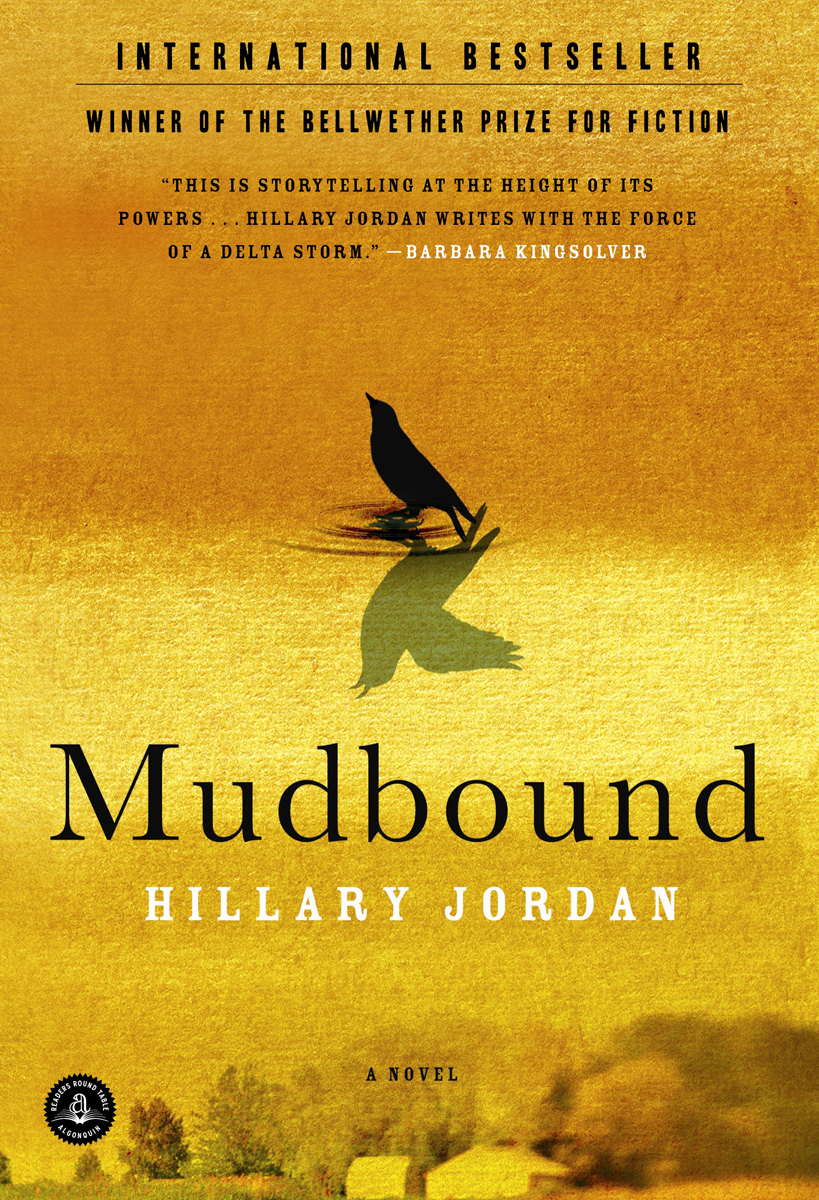23 Mar / Mudbound by Hillary Jordan

 I think I was somehow predestined to read Mudbound when I did: just after I finished Barbara Kingsolver‘s mightily disappointing Flight Behavior, I turned next to Hillary Jordan‘s 2008 debut novel. While searching for an image of the book cover to load here, I noticed the golden sticker – an award nod for being the “winner of the Bellwether Prize for Fiction.” Timing is everything, right? – because the Bellwether (which morphed into the PEN/Bellwether Prize for Socially Engaged Fiction in 2012) was founded and funded by none other than Kingsolver herself.
I think I was somehow predestined to read Mudbound when I did: just after I finished Barbara Kingsolver‘s mightily disappointing Flight Behavior, I turned next to Hillary Jordan‘s 2008 debut novel. While searching for an image of the book cover to load here, I noticed the golden sticker – an award nod for being the “winner of the Bellwether Prize for Fiction.” Timing is everything, right? – because the Bellwether (which morphed into the PEN/Bellwether Prize for Socially Engaged Fiction in 2012) was founded and funded by none other than Kingsolver herself.
In case you’re starting to wonder, here’s the verdict: Mudbound is the far better title on the page, and stuck in the ears, as well. You’ll find no anemic, strangely accented, self-narration here; instead, a full cast voices the multiple narrators, with especially effective performances by Kate Forbes as the controlled Laura, Ezra Knight as desperately proud Ronsel, Brenda Pressley as the stalwartly tragic Florence. Mudbound proves to be one of the those rare assured debuts that send you instantly looking for more: luckily, Jordan has another title I’ve already iPod-loaded.
Mudbound opens with death: two brothers, Henry and Jamie, are digging their father Pappy’s grave. The power of a dead man to ooze such vitriolic hate over the 300-plus pages that follow is a horrific reminder of the worst in mankind. World War II is over, and the Americans who return home are both victorious and maimed, most deeply by scars invisible to the eye. In the deep South of the Mississippi Delta, the McAllan cotton farm – owned by land-loving Henry and his city-raised wife Laura – welcomes two veterans, Henry’s much younger brother Jamie and Ronsel Jackson, the oldest son of Henry’s tenant sharecropper. Ronsel’s father Hap works Henry’s land; his mother Florence helps Laura in the rustic farmhouse. Both Jamie and Ronsel are decorated war heroes, and yet Ronsel’s dark skin will damn him to abusive treatment without cause.
Jamie, Laura, Ronsel, Henry, Florence, and Hap each take narrative turns, and yet the story is driven by Pappy’s inescapable hate … with heinous consequences. The last few chapters of the book are unrelenting nightmares, once read/heard/imagined, never to be erased. And yet somehow, with Pappy finally in the ground, hope might prevail: “Might even find something like happiness. That’s the ending we want, you and me both. I’ll grant you it’s unlikely, but it is possible.”
Sometimes that possibility is all that keeps us going …
Readers: Adult
Published: 2008

I often make a note of one of your titles intending to get it and then lose it (the note to myself) – this is probably a dumb question that I should be able to figure out, but does your site maintain a record of past reviews? Thanks Jim
Yes, sort of … but definitely not by viewer. I can go back a certain number of days and see which posts were most viewed.
You could sign up for email alerts, and then you would get every post delivered in your inbox. You can trash the ones you don’t have any interest in, and just file away the ones you might read in the future. How’s that?
I read this a few years ago and enjoyed it, kind of reminds me of The Secret Life of Bees.
I read Bees years ago, too, but would never have made that connection, although now that you mention that title, I do recall the violence perpetrated on the young girl’s family servant/nurturing friend. Her father was an abusive schmuck, too, as I recall — that’s why they had to leave town and end up with the bee-keeping sisters.
That said, I didn’t hang on to — and perhaps because I’m just getting old and not remembering all the details — any sort of visceral HATE after reading Bees. It was overall a feel-good read … because it was balanced out with so much love (even if some of it was saccharine), the violence and evil had a bit of balance (that sounds so off, but hopefully you know what I mean). Pappy in Mudbound never, ever let up — for me, he just poisoned every single page. I was always relieved to know that he was in the ground from the first page, but he still loomed with terror. If nothing else, Hillary Jordan sure knew how to create an effective monster!
I guess I was thinking more of the camaraderie between the two young men in Mudbound, which is the strongest memory I retained, representing hope for the future and the connection in The Secret Life of Bees between Lily and one of the sisters, another relationship frowned on by some (no matter what their colour). For me Pappy was someone I buried too, not wanting to carry someone like him anywhere in my reading memory.
I’ll need to take your lead!!! He’s still giving me nightmares, egads!